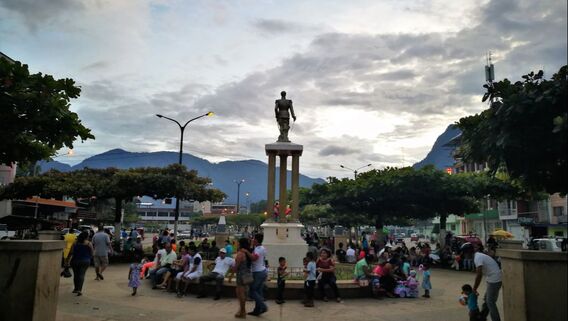|
By Anya Shukla There’s a lot of anti-Blackness and anti-queerness in this book. I can’t tell if this is a “sign of the times” or genuine commentary on racism/homophobia in Peruvian society… but either way, I don’t have to like it. If you want to read this book (and honestly, I’m not sure I would want to read this book after looking back over this review, but to each their own), be ready for some uncomfortable moments. Review: At Leoncio Prado, a Peruvian military academy, order and justice ostensibly reign supreme. Yet beneath the surface, the third-years (the “Fifths”) drink, gamble, and haze the “Dogs,” or younger students. When the Fifths’ leaders—a gang of four boys known as the Circle—cheat on an exam, they set off a chain of events that leads to the death of a student and exposure of their actions. So controversial that the real-life Leoncio Prado Military Academy ordered 1,000 copies of the book burned, Mario Vargas Llosa’s “The Time of the Hero” set him up for literary success: he would go on to win the 2010 Nobel Prize for Literature. Although accurate, the novel’s harsh depiction of toxic masculinity and military life go a little too far. My Rating: 4/5. What I Loved: For the most part, I enjoyed the writing style. Vargas Llosa draws the reader in from the first chapter, opening in-medias-res with the Circle rolling dice to determine who must steal the questions for an upcoming chemistry test. (Is this what all boarding schools are like?, I asked myself.) From then on, the pacing never falters: the fast-paced switching of perspectives ensures that I don’t get bored, and you can always count on at least one eyebrow-raising incident (see: What I Didn’t Love) to make you incredibly concerned for these boys’ futures. To that end, I love the way Vargas Llosa highlights the issues with toxic masculinity in a military environment without preaching. There’s a need for the boys to prove their worth as men: Alberto dreams about going to a prostitute because he wants to catch up to the other cadets’ sexual experience; many boys joined the academy because their fathers feared they were going soft; in this hyper-heterosexual space, being called a “fairy” is the ultimate insult. At no point does Vargas Llosa explicitly say no one should ever have to deal with this, but after reading through the brutal initiation rites; drinking games; continual bullying, fighting, and name-calling; and eventual murder, you kinda get the sense that he’s not a fan. And these boys’ actions are so far from my normal that by the end of the second or third chapter—by the end of part one for sure—I was definitely not a fan either. Vargas Llosa saw Leoncio Prado—a place where cadets could almost get away with anything—as a microcosm of Peru. I’m not too familiar with the country in the 1950s, but I think we’ve seen similar situations play out throughout world history, where a government branch or the military covers up a mistake so as to avoid censure from higher-ups. (I’m thinking about the Mai Lai Massacre in Vietnam, but I’m sure there are other incidents as well.) I wonder how these incidents play out differently in the age of cancel culture and social media, where the slightest error could lead to mass distrust. Will we see more apologies or uncover larger cesspools of toxicity? What I Didn’t Love: So… this book had a lot of weird incidents that I wasn’t expecting and didn’t especially love. Like one scene where the boys in the Circle have sex with a chicken. After the moment I alluded to in my “The Sympathizer” review last week, I really did not want to read another episode of beastiality. And yet. I suppose these incidents showcase the brutality and he-man-ness of life in a military academy. But the visuals just weigh on my chest; I never enjoy reading them. This book has also been lauded for its narrative style: multiple perspectives that weave between the past and present. I personally felt like the perspectives “sounded” too similar: sometimes, the only way to tell which chapter belonged to which cadet was by going back and matching up the details of their backstories. But maybe the differences were just too subtle for me to catch. A Quote I Would Like On Goodreads: “‘If they ever had to fight a real battle,’ the captain said, ‘they’d all be cowards and deserters’” (pg. 341). Up next: “In the Dream House” by Carmen Maria Machado.
0 Comments
Your comment will be posted after it is approved.
Leave a Reply. |
Archives
February 2023
Categories
All
|

 RSS Feed
RSS Feed